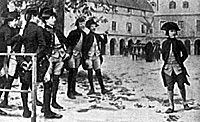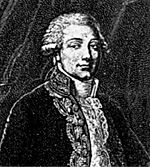
A Corsican provincial who spoke French poorly, Napoleon endured numerous irritations and slights from his aristocratic schoolmates at Brienne, where his inferior status as a charity case was keenly felt. For five years, from 1779 to 1784, he struggled to learn French and endured continuous humiliations from his classmates.
Napoleon learned to curb his rage at his various tormentors, but, in true Corsican fashion, he secretly burned for revenge. He developed a hatred of the French and dreamt of his eventual return home, where he could put his education to use in Paoli's service and deliver the island from his enemies. Such fantasies strengthened his resolve to succeed, and Napoleon was often quite passionate in advocating the greatness of his hero Paoli to his fellow students. Over time he appears to have become a leader of his class, and, as legend holds, may have led the younger students to a victory in an epic snowball fight where they trounced their seniors.
Napoleon excelled in mathematics, geography and history but loathed Latin and dance. Reputedly, he was the most prodigious reader in the school, and was particularly fond of Rousseau, Corneille, and Plutarch. In his spare time, Napoleon cultivated an elaborate garden, perhaps as a means to alleviate his homesickness, and certainly as a place where he could escape to meditate and to read.
 During the school's annual holidays, Napoleon was too poor to travel home. However, in the summer of 1782, just before he turned thirteen, Carlo (at right) and Letizia came to visit Brienne, Letizia's beauty making quite an impression on the cadets. Carlo, meanwhile, had other motives for the trip. In addition to seeking more assistance for the education of the Bonaparte children, he was appealing for funding from the financially strapped French monarchy to drain some salt marshes near Ajaccio.
During the school's annual holidays, Napoleon was too poor to travel home. However, in the summer of 1782, just before he turned thirteen, Carlo (at right) and Letizia came to visit Brienne, Letizia's beauty making quite an impression on the cadets. Carlo, meanwhile, had other motives for the trip. In addition to seeking more assistance for the education of the Bonaparte children, he was appealing for funding from the financially strapped French monarchy to drain some salt marshes near Ajaccio.
Napoleon's life improved when in the fall of 1784, at the age of fifteen, he enrolled in the prestigious Ecole Militaire in Paris. Naturally, the greatest city in the world made a deep impression upon Napoleon, and the awkward provincial would slowly be transformed by the refinements made available to him, for the Ecole Militaire was in large part a finishing school for gentleman officers. Many of the wealthier students could afford ostentatious lifestyles, replete with servants. Napoleon, who was noted for a lean, hungry look that resulted in part from his lack of funds, glimpsed firsthand the reasons behind the resentments that were building in French society. This cognizance led him to choose the artillery as his branch of service -- here class and privilege mattered less than in the cavalry or infantry.
Before he left school, however, tragedy struck. In February of 1785, Napoleon's father Carlo died of stomach cancer. Characteristically, young Napoleon took the news bravely, mourning in private, while resolving to finish school as quickly as possible so as to allow him to help the family. Impressively, Napoleon would graduate in only a single year of class work whereas many a dilettante could take as long as three years of school while savoring the lavish delights of Paris. In October 1785, the sixteen-year-old Lieutenant Buonaparte left Paris to join the prestigious La Fere Artillery Regiment in Valence, the closest garrison to Corsica.
More Napoleon: Introductory Guide
-
Introduction
Prejudice and Pride
Napoleon in Military School
The Young Artillerist's Double Life
Revolution & Opportunity
Women's Fashion During the Revolution
The Siege of Toulon
Napoleon & Josephine
Women's Fashion during the Directory
Fame & Glory: Italy
Fame & Glory: Egypt
Saviour or Usurper
Battle of Marengo
Civil Achievments
Enlightened Despot or Tyrant
Napoleon's Siblings
The Dawn of Gastronomy
Haydn and Beethoven
Women's Fashion during the Empire
Napoleon's Other Women
The Mashalate and Imperial Eagle
History's Greatest General?
Back to Table of Contents -- Napoleon #17
Back to Napoleon List of Issues
Back to MagWeb Master Magazine List
© Copyright 2001 by Napoleon LLC.
This article appears in MagWeb (Magazine Web) on the Internet World Wide Web.
The full text and graphics from other military history magazines and gaming magazines are available at http://www.magweb.com
Order Napoleon magazine direct